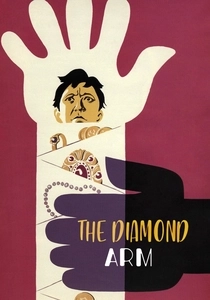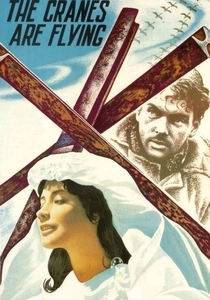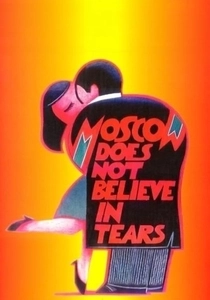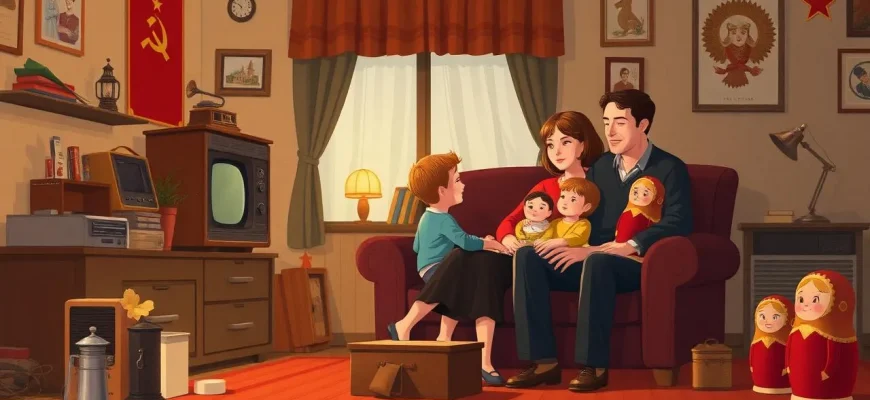Soviet cinema has always had a special place for family dynamics, exploring the intricate relationships, societal expectations, and personal struggles that define family life. This curated selection of Soviet films delves into the heart of family themes, offering a window into the past that resonates with universal truths about love, duty, and the bonds that tie us together. Whether you're looking for heartwarming stories, poignant dramas, or insightful comedies, these films provide a rich tapestry of Soviet family life, making them a must-watch for anyone interested in cultural history or simply seeking a good, old-fashioned family tale.

The Diamond Arm (1969)
Description: While primarily a comedy about a man unwittingly involved in a smuggling ring, it also touches on family themes through the protagonist's interactions with his wife and daughter, highlighting the importance of family support.
Fact: It was one of the highest-grossing Soviet films of all time, beloved for its humor and memorable characters.
 Watch Now
Watch Now 
The White Sun of the Desert (1970)
Description: This adventure film set in the desert also touches on themes of family and loyalty, as the protagonist navigates through personal and political turmoil, reflecting on the importance of family bonds.
Fact: It has become a cult classic, often quoted and referenced in Russian popular culture.
 Watch Now
Watch Now 
The Dawns Here Are Quiet (1972)
Description: While primarily a war film, it delves into the personal lives of the female soldiers, exploring themes of family, duty, and sacrifice, offering a poignant look at how war affects families.
Fact: The film was adapted from a novel by Boris Vasilyev and was remade in 2015, showcasing its enduring popularity.
 Watch Now
Watch Now 
The Adventures of Buratino (1975)
Description: This family-friendly adaptation of Carlo Collodi's "The Adventures of Pinocchio" captures the essence of childhood, family, and the quest for identity, making it a timeless classic for all ages.
Fact: It was one of the first Soviet films to be widely distributed in the West, gaining popularity for its charm and universal appeal.
 Watch Now
Watch Now 
The Cranes Are Flying (1957)
Description: This poignant drama captures the essence of family life during wartime, focusing on the emotional turmoil of a young woman whose fiancé goes missing in action. It's a testament to the resilience of family bonds in the face of adversity.
Fact: The film won the Palme d'Or at the Cannes Film Festival in 1958, making it one of the first Soviet films to achieve such international acclaim.
 30 Days Free
30 Days Free 
The Irony of Fate (1975)
Description: This beloved New Year's comedy revolves around a mix-up that leads to a man ending up in the wrong apartment, sparking an unexpected romance and a humorous exploration of family and relationships.
Fact: It has become a tradition in Russia to watch this film every New Year's Eve, making it an integral part of the holiday celebration.
 30 Days Free
30 Days Free 
Office Romance (1977)
Description: This romantic comedy delves into the complexities of workplace relationships and family life, showcasing how personal and professional lives intertwine in Soviet society.
Fact: The film was a massive hit, leading to a sequel and numerous adaptations in other countries.
 30 Days Free
30 Days Free 
Moscow Does Not Believe in Tears (1980)
Description: A sweeping saga that spans decades, this film follows three women as they navigate love, career, and family life in Moscow, offering a deep dive into the changing dynamics of Soviet society.
Fact: It won the Academy Award for Best Foreign Language Film in 1981, becoming one of the most successful Soviet films internationally.
 30 Days Free
30 Days Free 
A Cruel Romance (1984)
Description: Based on Alexander Ostrovsky's play, this film explores the societal expectations of marriage and family in 19th-century Russia, offering a critique on the institution of marriage and the roles of women.
Fact: The film was nominated for the Golden Prize at the Moscow International Film Festival.
 30 Days Free
30 Days Free 
The Garage (1979)
Description: A satirical look at Soviet bureaucracy and human nature, this film uses the setting of a garage cooperative to explore themes of friendship, betrayal, and the lengths people go to for personal gain, all within a family context.
Fact: The film was initially banned for its critical portrayal of Soviet society but was later released due to public demand.
 30 Days Free
30 Days Free 








